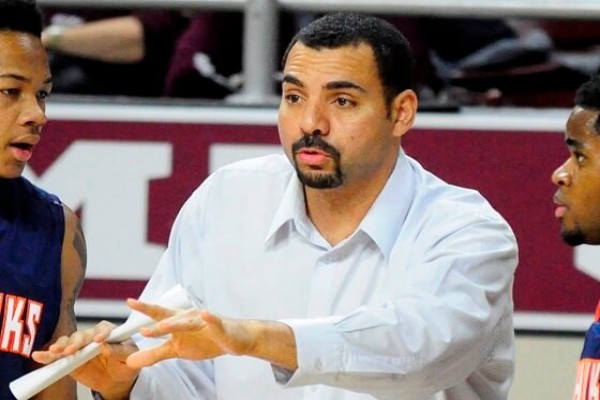Climbing the Hill
Mid Major Notebook : Climbing the Hill
Print

Anthony Stewart begins his first season as the head coach at UT Martin.
Anthony Stewart was walking through a Columbus, Ohio shopping mall one afternoon in 2000, when he ran into an old friend named Anthony Gholson.
Stewart was 29, married with three kids and had just built a new house. He’d recently moved to Columbus for a $200,000 a year job with Schneider Trucking. Life was good.
His friend made Stewart an offer that didn't fit any of his plans.
Stewart knew Gholson from his basketball playing days at Mount Union (OH), a Division III program. Gholson had been an assistant at a rival school. Now he was the new athletic director and head basketball coach at Columbus (OH) State Community College. The program had no history and a shaky future, at best. Gholson asked Stewart to be his assistant. Stewart declined.
Gholson persisted, calling Stewart every day for three weeks. Stewart relented - under one condition. Practices must be held at 6 a.m. so Stewart could hold a mandatory daily teleconference with Schneider managers from around the nation. Gholson agreed. Stewart started looking for players.
Last April, Stewart became the head coach at Tennessee-Martin. He’d spent the previous two years as the associate head coach there, helping Heath Schroyer build the program. Schroyer, a defensive specialist, departed to join Mark Gottfried’s staff at N.C. State.
Tennessee-Martin won 41 games the last two seasons. The program won 37 games in the previous five. The Skyhawks competed in the CollegeInsider.com Postseason Tournament each of the last two seasons.
“This is not like most situations where you take over a program that hasn’t been winning or has fallen on hard times,” Stewart said. “I’ve taken the bull by the horns and run with it. A lot of people we’re all looking for utopia sometimes. We want what we want, when we want it, how we want it. There are 351 Division I coaching opportunities on planet Earth and I have one of them.”
At the time, Stewart was named interim coach for the 2016-17 season, but he’s expected to trade that tag for a multi-year contract in the coming weeks.
It begins the next chapter of a remarkable, improbable journey.
Stewart jokes that he’s here by sheer accident, living on borrowed time.
In a way, he’s right.
Stewart grew up in Pittsburgh, Pa., in the Hill district, a neighborhood brought to life from 1981-87 on the award-winning NBC crime drama Hill Street Blues. Drugs, gangs and violent crime prevailed in the African American community. A character on the show, Sgt. Phil Esterhaus, always told his officers to “be careful out there” and with good reason.
Stewart had no relationship with his father. His mother battled health issues and did the best she could.
“I pretty much raised myself up until the age of 15,” he said.
Rather than stand out as intelligent and well-spoken, Stewart said he became a chameleon. Serious trouble ensued.
“The trouble had some consequences,” he said. “Those consequences were leading toward a mandatory prison sentence, doing adult time as a juvenile.”
Stewart avoided the penitentiary by moving to Akron, Ohio and living with his father’s parents. His grandfather was a podiatrist; his grandmother was a retired public school teacher.
They were well-respected and successful. They gave their grandson the structure and accountability he needed. He turned to athletics and became a star baseball and basketball player at Archbishop Hoban, a Catholic high school in Akron. It led him to Mount Union College (now the University of Mount Union), a liberal arts college with a Division III athletic program in Alliance, Ohio.
Stewart played both sports at Mount Union. He graduated in 1993 with a degree in business management and shortly thereafter landed a good job in logistics and transportation planning.
Seven years later as his corporate career ascended, the game of basketball came along again and changed his plans.
Columbus State started winning, winning big. It climbed to No. 1 in the nation in the NJCAA poll during the 2003-04 season. Division I college coaches poured through the gymnasium doors to recruit the talent Stewart had lured to campus. They told him he should be coaching fulltime at a higher level. He explained how he was making $260,000 a year - before his annual bonus. Taking a third assistant position at some mid-major program where he might make $30,000 made no fiscal sense.
But the reward from his impact outweighed his bank account.
“I realized I got more fulfillment out of helping those kids reach their goals and get one chance at doing something they loved to do than I did in my corporate job,” he said. “I had to make some changes.”
So, he went home and told his wife, Cheryl, he was contemplating a career change that came with a serious pay cut.
“She thought I lost my mind,” he recalled. “She thought I was having a nervous breakdown to be honest with you.”
But she came around, realizing coaching was his calling. And the journey began on the bench at Long Beach State for the 2004-05 season. After two years there, he headed to Wyoming where he worked under Schroyer. Then, it was a year at Southern Illinois, working for Chris Lowery.
Stewart was a guy who knew everybody, Lowery said. If you needed a high school point guard, he could find one. If you needed a junior college power forward, he had the relationships to land one as well. If a kid needed a place to play, Stewart would help him find the right junior college where he could continue his career.
“The most important thing about him is he’s a relationship program, works hard at the relationships, on his staff and in the program,” Lowery said. “He’s going to understand each one of the players in the program, how to use them how to push their buttons, how to utilize his assistants the same way. Has a great chance there. He is a business person so he takes that with him. Makes shrewd decisions in recruiting and about people.”
Stewart spent one season at Southern Illinois and the next two working for Jim Christian at Ohio University before reuniting with Schroyer at UTM.
Tennessee-Martin reached the Ohio Valley Conference championship game last season for the first time in school history, but three of the top four scorers have used all their eligibility. Jacolby Mobley is the best veteran returning (10.5 ppg). The senior guard said it’s been an easy transition from Schroyer to Stewart as the head man.
Stewart has remained true to his business roots. They still practice at 6 a.m. He prepares his players for the end of their hoops career and the beginning of their business life by demanding they dress, behave and approach academics in a professional manner.
“Life comes before basketball with coach,” Mobley said. “He likes to get us ready for life and help us from making the same mistakes he made. A lot of things in life ain’t gonna be fair. And you know some things you may not want to do and you may not like it but you have to grow up and be a man, suck it up and deal with it.”
The players often hear “R-T-P.” Respect the process.
“Success is a process,” he said. “It rarely rewards the wrong person.”
UTM, which opens the season Nov. 11 at Ole Miss, is predicted to trail Murray State in the OVC West by KenPom.com and was tabbed fourth in the division in the conference’s official poll. There are seven returnees and nine newcomers. Stewart spent the summer focusing on improving their nutrition and weight training regimen.
The players hear fragments of information about Stewart’s past, Mobley said.
They’ll be wise to listen when he shares.
“He’s proud that he’s from the Hill District. He knows guys who are in jail and guys who are dead,” Lowery said. “For him to be as worldly as he is, is a credit to him. He could’ve easily chosen a path that he wouldn’t be proud to tell his children about. That’s the biggest thing about him and that’s a good thing about America. You can go through those type of things and you can come out on top and come out as a role model. He got a victory over his circumstances.”



